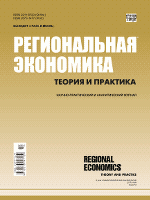Abstracting and IndexingРИНЦReferativny Zhurnal VINITI RAS Worldcat LCCN Permalink Google Scholar Online availableEastvieweLIBRARY.RU Biblioclub |
Reproduction of labor capacity in the local territories of the Republic of Karelia
Available online: 6 August 2014 Subject Heading: REGION'S LABOR CAPACITY JEL Classification: Pages: 47-54
The author points out that the reproduction of the labor capacity in the last decade is increasingly exposed to the impact of the educational, professional, vocational and qualification and territorial mobility of the population. The role of mobility is constantly growing and becomes increasingly important for the reproduction of the labor potential in the local territories. The main goal of the research is the analysis of the institutional environment of the reproduction of the labor potential of the municipalities on the basis of obtaining of qualitative information. The expert estimates, which were obtained during semi-structured interviews with representatives of regional and municipal authorities, social workers, enterprises, as well as the results of the focus groups comprising the local community in two municipalities in the Republic of Karelia, served as the empirical base of the research. The results reflect the well-established institutional conditions of reproduction of labor potential in the municipalities of the Republic of Karelia: labor markets and housing, as well as the professional education and health care sectors. The paper reveals the following: that at the present time the aforementioned sectors do not contribute to the efficiency of reproduction of labor capacity of the municipalities in the Republic of Karelia; that the current trends of socio-demographic and migratory processes were identified and the value of their influence on the reproduction of the labor potential was received and that proposals of the local community on enhancing of the effectiveness of the processes of reproduction of labor potential at the local territories of the Republic of Karelia were submitted. The results of the research can be used by local self-governing bodies and regional executive authorities to improve the reproduction of the labor capacity at the municipal level. The article presents the following conclusions: the reproduction of the labor potential at the local level in the Republic of Karelia is facing the negative impact of major socio-economic institutions, underlying its formation, distribution and use; under the prevailing institutional conditions processes of socio-labor and spatial mobility enhance the decrease in both qualitative and quantitative characteristics of reproduction of labor potential. The author emphasizes that in order to improve the efficiency of reproduction of the labor potential it is necessary to improve the quality of the relevant institutional environment. Keywords: labor capacity reproduction, region, institutions References:
|
ISSN 2311-8733 (Online)
|
|








